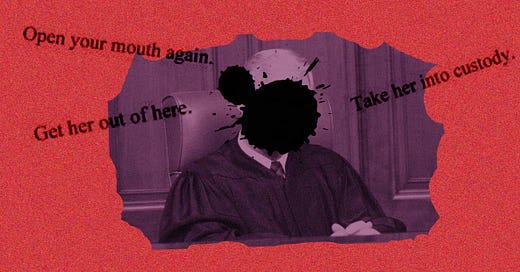New NBC Report: “Judges Exert Near-Absolute Power”
Why Judicial Accountability Won't Help in Custody Cases
[Image from article: Shahrzad Elghanayan/NBC News; Getty Images]
Judges exert near-absolute power in deciding who wins custody of children…
Eric Ortiz, NBC investigative journalist
The new NBC News investigative report “Robed in secrecy: how judges accused of misconduct can dodge public scrutiny” by Eric Ortiz reveals how bad behavior by judges is common, and how they are rarely held accountable in any meaningful way.
Ortiz’s exposé has caused much celebration amongst moms battling in Family Court, who see it as validating and as a solution to the crisis of unjustly losing custody and being unable to protect their children. Cries of “Accountability!” and “Oversight!” have often been heard over the years in the halls of social media, and this is welcome publicity.
However, a lack of judicial accountability is not the real problem in Custody Crisis cases, nor is more accountability the solution.
ETHICAL COMMISSIONS
There are two ways litigants can hold judges accountable within the system: appellate courts and state ethical commissions. This new report deals only with ethical commission oversight, and it lays the blame at the secrecy of the process of investigating complaints against judges. Transparency is proffered as the solution.
But only about 1% of complaints are founded anyway, and the discipline meted out usually amounts to a slap on the wrist, as Ortiz points out. Cases in which the harshest discipline is imposed—the judge being removed from the bench—are rare.
So it is doubtful that more transparency will “transform the judiciary” or even make much of a difference in civil or criminal court. What is certain is that it won’t help at all in Family Court.
Why?
UNLIMITED DISCRETION
The reason is that when Family Court judges disregard evidence and falsely find mothers to be lying, alienating or mentally ill (or whatever), they are not violating ethical codes. Judges are simply exercising the virtually unlimited discretion bequeathed upon them by a specialized system for deciding divorce and custody.
Another problem with focusing on “judicial accountability” is that comes after the fact. Custody has already been granted to the father, empowering him to brainwash, bribe, trauma bond, coerce and/or threaten children into silence and complicity. The judge can then rely on this “agreement” by the children to live with their father to justify keeping custody with him.
Not to mention the risk of judicial retaliation for submitting a compliant. Judges will likely remain on the case and can make sure a complaining mother never sees her children again unsupervised, or even at all.
FALSE FINDINGS
The main point here, though, is that false findings which lead to mothers losing custody are not the purview of an ethical commission, only unethical behavior, which shines a bad light on and undermines confidence in the judiciary.
In the best case scenario, if judges begin to be held more accountable, they will simply behave better while still unjustly switching custody. So it does no good for women desperately trying to keep and protect their children.
Nor, by the way, are false findings the purview of appellate courts. These higher courts use the special “abuse of discretion” standard in custody cases, which is nearly impossible for mothers to overcome.
So, the only two ways to hold judges accountable—ethical commissions and appellate courts—are useless. The result is that judges can basically do whatever they want, and what they want far too often (or are expected to do) is keep men empowered in “their” family, i.e. systemic male entitlement/persisting patriarchy.
POWER’S THE PROBLEM
Ortiz is right when he says, “…judges exert near-absolute power in deciding who wins custody of children…”
Judicial power is the problem in contested custody cases, not judicial misconduct.
The fact that there is absolutely no way to prevent judges from making bogus findings that deprive loving mothers of custody and the power to protect their children, necessitates a new system in which judges do not have the power to decide custody. That is a system in which a jury of peers in a regular civil court decides such an important life-altering matter.
And the only way to gain enough power to demand a new system which takes custody-deciding power away from all-powerful judges is for women to join together as a class, as half the population, just as the suffragists did for the vote.
Join us at The Women’s Coalition where we are gathering troops for the battle.
I don’t trust any judge…
A woman interviewed for the NBC story said, “I don’t trust any judge…”
She is speaking for millions of mothers around the world who’ve been unlucky enough to find themselves in Family Court battling to keep and protect their children.





When will there be meaningful reform? I cant believe the systemic travesty daily done in family courts
Like thousands of women, my daughter was torn to shreds in court and her kids totaled, because her ex is a cop in a small town. There is zero oversight on these judges.